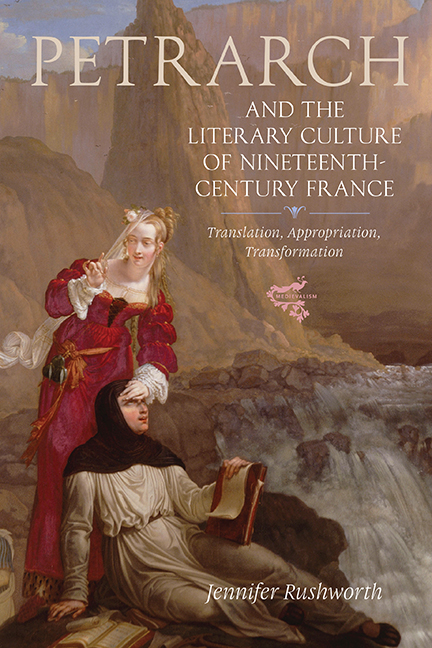 Petrarch and the Literary Culture of Nineteenth-Century France
Petrarch and the Literary Culture of Nineteenth-Century France from I - Translations
Published online by Cambridge University Press: 09 May 2017
AS WE HAVE SEEN in the Introduction, late eighteenth- and nineteenth-century French readers and translators of Petrarch sought to highlight his association with France, and with Avignon and the surrounding countryside in particular. In this chapter, further manifestations of this locally motivated interest in Petrarch are explored in relation to celebrations of Petrarch held in Avignon and Fontaine-de-Vaucluse at key moments throughout the nineteenth century. These celebrations of Petrarch and Avignon had a fatal, often thinly veiled flaw: Petrarch's own dislike of Avignon, which I have heretofore, much like most French nineteenth-century readers of Petrarch, set deliberately to one side. This dislike is most intensely expressed in three sonnets in the Canzoniere, RVF 136–8, as well as in a collection of nineteen Latin letters, enigmatically entitled the Sine nomine (Without Name). The various ways in which French translators deal with these two sets of texts forms the second part of this chapter. The first part of this chapter sets the festal stage over which these two sets of texts stubbornly and intermittently cast their awkward shadows.
Petrarchan Festivities in Nineteenth-Century Avignon
Nineteenth-century Avignon was a key ‘site of Petrarchism’ and a vital ‘Petrarchan place’.From the days of the Avignon papacy until the French Revolution, Avignon had remained a papal annexe governed by the Vatican. At the French Revolution, after a series of revolts and not inconsiderable local and papal resistance, Avignon was officially recognized as part of France by the Assemblée nationale on 14 September 1791. When Avignon became part of the French Republic, both therefore had a newly vested interest in recovering Avignon's medieval past as French, and the ensuing acts of recuperation were expressed in part through a variety of Petrarch-inspired celebrations, often around key anniversary dates, beginning with 1804, peaking in 1874, and continuing into the early twentieth century with 1904.
The first anniversary celebrations dedicated to Petrarch and organized in Avignon were those of 1804, Petrarch's five hundredth birthday, although the poet's various homes in Arezzo, Fontaine-de-Vaucluse, and Arqua (some more historically verifiable than others) had long been important sites of literary pilgrimage and devotion. The 1804 festivities were modest affairs compared to later events, although they were an early success for the only recently established Avignon-based institution responsible for promoting Petrarch throughout the nineteenth century, the Athénée de Vaucluse, later rebranded the Académie de Vaucluse.
To save this book to your Kindle, first ensure no-reply@cambridge.org is added to your Approved Personal Document E-mail List under your Personal Document Settings on the Manage Your Content and Devices page of your Amazon account. Then enter the ‘name’ part of your Kindle email address below. Find out more about saving to your Kindle.
Note you can select to save to either the @free.kindle.com or @kindle.com variations. ‘@free.kindle.com’ emails are free but can only be saved to your device when it is connected to wi-fi. ‘@kindle.com’ emails can be delivered even when you are not connected to wi-fi, but note that service fees apply.
Find out more about the Kindle Personal Document Service.
To save content items to your account, please confirm that you agree to abide by our usage policies. If this is the first time you use this feature, you will be asked to authorise Cambridge Core to connect with your account. Find out more about saving content to Dropbox.
To save content items to your account, please confirm that you agree to abide by our usage policies. If this is the first time you use this feature, you will be asked to authorise Cambridge Core to connect with your account. Find out more about saving content to Google Drive.